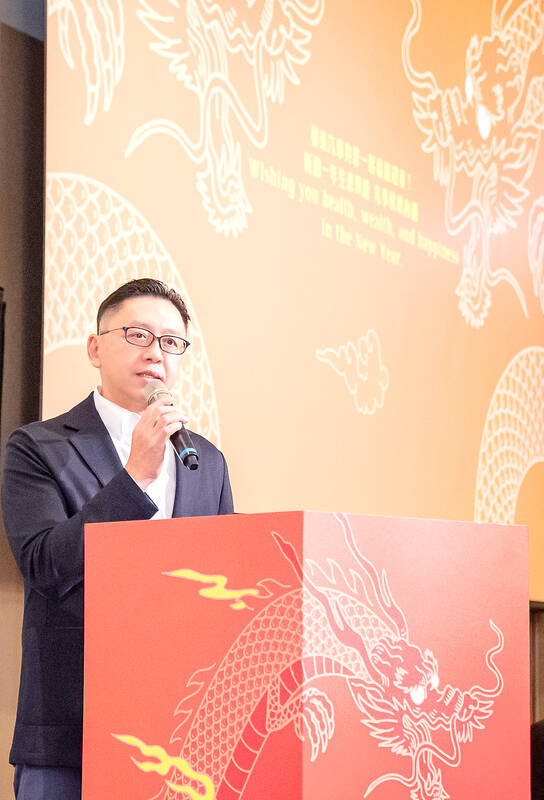Hotai Motor Co (和泰汽車), which distributes Lexus, Toyota and Hino models in Taiwan, yesterday said it aimed to boost vehicle sales this year to a new record, benefiting from the introduction of new models and stable automobile production amid improved chip supply.
Hotai’s goal is to increase its vehicle sales this year to about 170,000 units after scoring a historical high sales figure of 166,000 units including commercial vehicles last year, the company said. If not, the distributor would see a 2.4 percent annual increase in car sales this year.
That sales growth would help Hotai grab a larger slice of the domestic market of about 37.8 percent, this year, the company said.

Photo courtesy of Hotai Motor Co
Hotai has maintained its position as the nation’s top car distributor for 22 years with its market share rising to 34.9 percent last year, the company said.
Addressing consumers’ replacement demand, Hotai plans to introduce new models, including a major revamp to Toyota’s Camry sedan and Toyota GR Yaris, a sport compact car, in the fourth quarter, Hotai president Justin Su (蘇純興) said in a company statement.
In addition, Lexus’ new LBX model hit the market last month and a new electric series, UX 300h, would be available soon, he said.
On the commercial vehicle side, Hotai plans to introduce Toyota’s H2 City Gold electric bus powered by hydrogen later this year, matching local governments’ promotion of electrification of urban bus fleets, Su said.
Last year was a phenomenal year for Taiwan’s auto market with overall new vehicle sales climbing 11 percent year-over-year to 476,987 units, hitting the highest level in 18 years, government data showed.
Su expects domestic new car sales to come down to a normal level of 450,000 units this year, thanks to an extension of government incentives for purchasing new cars.
Besides, global automakers have seen car production return to normal, ending a prolonged supply crunch, he said.
However, geopolitical tensions and the central banks’ interest rate policy remained major uncertainties that would affect market sentiment, he said.

TAKING STOCK: A Taiwanese cookware firm in Vietnam urged customers to assess inventory or place orders early so shipments can reach the US while tariffs are paused Taiwanese businesses in Vietnam are exploring alternatives after the White House imposed a 46 percent import duty on Vietnamese goods, following US President Donald Trump’s announcement of “reciprocal” tariffs on the US’ trading partners. Lo Shih-liang (羅世良), chairman of Brico Industry Co (裕茂工業), a Taiwanese company that manufactures cast iron cookware and stove components in Vietnam, said that more than 40 percent of his business was tied to the US market, describing the constant US policy shifts as an emotional roller coaster. “I work during the day and stay up all night watching the news. I’ve been following US news until 3am

Six years ago, LVMH’s billionaire CEO Bernard Arnault and US President Donald Trump cut the blue ribbon on a factory in rural Texas that would make designer handbags for Louis Vuitton, one of the world’s best-known luxury brands. However, since the high-profile opening, the factory has faced a host of problems limiting production, 11 former Louis Vuitton employees said. The site has consistently ranked among the worst-performing for Louis Vuitton globally, “significantly” underperforming other facilities, said three former Louis Vuitton workers and a senior industry source, who cited internal rankings shared with staff. The plant’s problems — which have not

UNCERTAINTY: Innolux activated a stringent supply chain management mechanism, as it did during the COVID-19 pandemic, to ensure optimal inventory levels for customers Flat-panel display makers AUO Corp (友達) and Innolux Corp (群創) yesterday said that about 12 to 20 percent of their display business is at risk of potential US tariffs and that they would relocate production or shipment destinations to mitigate the levies’ effects. US tariffs would have a direct impact of US$200 million on AUO’s revenue, company chairman Paul Peng (彭雙浪) told reporters on the sidelines of the Touch Taiwan trade show in Taipei yesterday. That would make up about 12 percent of the company’s overall revenue. To cope with the tariff uncertainty, AUO plans to allocate its production to manufacturing facilities in

TARIFF CONCERNS: The chipmaker cited global uncertainty from US tariffs and a weakening economic outlook, but said its Singapore expansion remains on track Vanguard International Semiconductor Corp (世界先進), a foundry service provider specializing in producing power management and display driver chips, yesterday withdrew its full-year revenue projection of moderate growth for this year, as escalating US tariff tensions raised uncertainty and concern about a potential economic recession. The Hsinchu-based chipmaker in February said revenues this year would grow mildly from last year based on improving supply chain inventory levels and market demand. At the time, it also anticipated gradual quarter revenue growth. However, the US’ sweeping tariff policy has upended the industry’s supply chains and weakened economic prospects for the world economy, it said. “Now